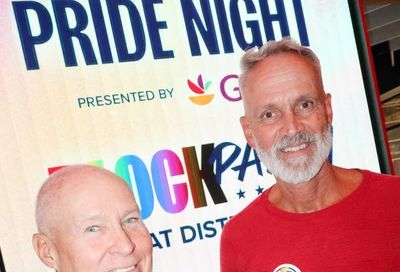News Analysis: NOM’s “Strategy for Victory” Shows Attempt to Sow Seeds of Discontentment
“Marriage will be won or lost in the United States in the next two to three years,” the previously confidential memorandum from 2009 stated.
In the summer of 2009, the National Organization for Marriage led off its “$20 million strategy for victory” memo with that assessment.
Weeks earlier, Nate Silver, then writing at fivethirtyeight.com, had looked at the polling on marriage in the months since California voters approved Proposition 8 and noted, “A pair of new polls shows for the first time a plurality of Americans in support of gay marriage, although they are contradicted by some other recent evidence.” Of polls that gave respondents options of only allowing same-sex couples to marry or not (as opposed to those polls that include civil unions as an option), Silver reported that the average was 43 percent for marriage rights and 53 opposed.
 Less than three years later, as part of a lawsuit by NOM seeking to keep its donors under wraps, the NOM memo, along with others, was unsealed on Tuesday, March 27, and obtained and released by the Human Rights Campaign. And, according to the latest polling measuring support for marriage equality across the country, a Public Religion Research Institute survey conducted between March 7 and 11 found that “[a] slim majority (52 percent) of Americans favor allowing gay and lesbian couples to marry, and 44 percent oppose.”
Less than three years later, as part of a lawsuit by NOM seeking to keep its donors under wraps, the NOM memo, along with others, was unsealed on Tuesday, March 27, and obtained and released by the Human Rights Campaign. And, according to the latest polling measuring support for marriage equality across the country, a Public Religion Research Institute survey conducted between March 7 and 11 found that “[a] slim majority (52 percent) of Americans favor allowing gay and lesbian couples to marry, and 44 percent oppose.”
NOM may have been right, but polling data suggests that “winning” may be in the eye of the beholder.
Among the strategies that the NOM documents show they had intended to advance during that time that marriage equality opposition flipped to marriage equality support include an effort “to drive a wedge between gays and blacks — two key Democratic constituencies” and, within the Latino community, to “interrupt … assimilation by making support for marriage a key badge of Latino identity.” Additionally, the documents show a concerted effort was planned to “accomplish a sophisticated cultural objective: interrupt the attempt to equate gay with black, and sexual orientation with race.”
To that end, NAACP chairman emeritus Julian Bond today noted in a statement, “NOM’s underhanded attempts to divide will not succeed if Black Americans remember their own history of discrimination. Pitting bigotry’s victims against other victims is reprehensible; the defenders of justice must stand together.”
Creating race-based, entrenched opposition to marriage equality wasn’t the only strategy revealed in the NOM documents. Seeking to “develop an effective culture of resistance” to marriage equality was the aim of a section titled, “Behind Enemy Lines: Document the Victims — Keeping Gay Marriage controversial in Massachusetts, Vermont and Connecticut.”
This “culture of resistance” would, per NOM’s strategy memo, be developed by, among other steps, “gather[ing] a rapid-response team of videographers and reporters to collect and record stories of those who have been harassed, threatened or intimidated as a result of their support for traditional views on marriage and sexuality across the country and also in Europe and abroad.”
Although efforts to focus on alleged “victims” of marriage equality supporters have been a regular facet of the public strategy opposing marriage equality in recent years, MassEquality executive director Kara Suffredini said in a statement, “The casual tone with which NOM outlines how it will turn fair-minded Americans against each other solely to hurt LGBT families speaks for itself. This is the ugliest example of a ‘solution’ in search of a problem.”
Back in the summer of 2009, NOM’s “strategic priority” for 2010 was to push marriage amendments in “politically significant, social conservative states,” which they listed as Indiana, North Carolina and Pennsylvania. None of the three states added marriage amendments to their constitutions in 2010 (or 2011, for that matter), and North Carolina is the only one of the three to face a marriage amendment this year.
With its eyes on 2012, even NOM’s 2009 strategy memo lays out that its aim is to “[n]ationalize the issue in the context of the next U.S. presidential election.” Among the specific ways it strategizes that it will do so is to “make marriage an issue in the 2010 election in [Iowa and New Hampshire].” Three Iowa Supreme Court justices were removed by Iowa voters in 2010, and Republicans took control of both chambers of the New Hampshire Legislature that year. Despite those victories, Iowa lawmakers have not moved forward on any effort to put a constitutional amendment on the ballot to end marriage equality in the state, and the New Hampshire House voted overwhelmingly earlier this month against reversing marriage equality there.
 NOM did make inroads in the 2012 Republican presidential primary by asking candidates to sign its marriage pledge, which, as NOM still stresses on its website, “Five GOP candidates have distinguished themselves as marriage champions by signing the NOM marriage pledge to voters.” In addition to committing them to supporting the Federal Marriage Amendment and defending the Defense of Marriage Act, candidates who sign the pledge agree to “establish a presidential commission on religious liberty to investigate and document reports of Americans who have been harassed or threatened for exercising key civil rights to organize, to speak, to donate or to vote for marriage and to propose new protections, if needed.”
NOM did make inroads in the 2012 Republican presidential primary by asking candidates to sign its marriage pledge, which, as NOM still stresses on its website, “Five GOP candidates have distinguished themselves as marriage champions by signing the NOM marriage pledge to voters.” In addition to committing them to supporting the Federal Marriage Amendment and defending the Defense of Marriage Act, candidates who sign the pledge agree to “establish a presidential commission on religious liberty to investigate and document reports of Americans who have been harassed or threatened for exercising key civil rights to organize, to speak, to donate or to vote for marriage and to propose new protections, if needed.”
Of the five signers, three of those — former Massachusetts Gov. Mitt Romney, former Sen. Rick Santorum and former House Speaker Newt Gingrich (Ga.) — remain in the race.
As NOM’s strategy during the past three years has been released and is being deconstructed by journalists and other observers, it was not particularly surprising for those who have been closely watching the organization like Good As You‘s Jeremy Hooper.
“One doesn’t ever want to be proven right when it comes to something like the intentional cultivation of animus, but I can’t say I was surprised to have these particular suspicions confirmed,” Hooper, who first wrote about NOM more than a year before the fall 2008 vote on Proposition 8, tells Metro Weekly. “From its inception, NOM has been working to separate Americans in ways both subtle and overt. Both supporters and opponents of marriage equality should be troubled by the dangerous games we now know to be NOM strategy.”
Support Metro Weekly’s Journalism
These are challenging times for news organizations. And yet it’s crucial we stay active and provide vital resources and information to both our local readers and the world. So won’t you please take a moment and consider supporting Metro Weekly with a membership? For as little as $5 a month, you can help ensure Metro Weekly magazine and MetroWeekly.com remain free, viable resources as we provide the best, most diverse, culturally-resonant LGBTQ coverage in both the D.C. region and around the world. Memberships come with exclusive perks and discounts, your own personal digital delivery of each week’s magazine (and an archive), access to our Member's Lounge when it launches this fall, and exclusive members-only items like Metro Weekly Membership Mugs and Tote Bags! Check out all our membership levels here and please join us today!




















